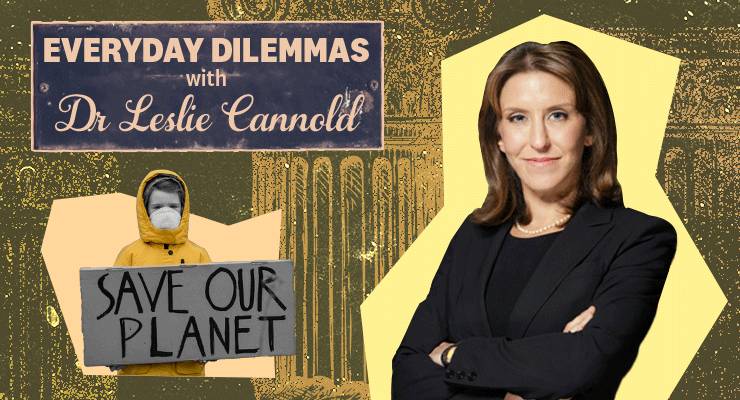
Dr Leslie Cannold has had enough of being even-handed and presenting Both Sides Now. She wants to cut to the chase: what’s the right way to go? In Everyday Dilemmas, Dr Cannold brings her ethical training to your problems. Send your questions to letters@crikey.com.au with “Dear Leslie” in the subject line. She might even reply…
Dear Leslie,
I keep hearing about the disaster unfolding in Wilcannia and Aboriginal people not getting vaccinated at the same rate as everyone else. What happens if we open up before they and other vulnerable groups in the community are protected? Wouldn’t it be better for me (a white woman in my thirties) to wait for my jab, then to take one of theirs?
Wanting to do my bit, NSW
Dear Wanting,
How lovely to hear from someone who considers the needs of others so carefully.
You’re right. It will be disastrous if Australia opens up when 80% of over 16s nationwide are double-dosed if beneath that headline figure are harder-to-reach communities who are not 80% covered. Not just for vulnerable populations but the entire community, because the unvaccinated act as a reservoir for the virus, which will continue to reproduce and to mutate, with the worst case scenario a variant that makes the Delta virus we’re currently battling look tame.
Despite this, delaying or declining your jab in the hope it goes to an Indigenous person is not the way to go. You won’t get a say in what happens to your foregone dose because that’s not how a massive logistical effort — like the one underway to vaccinate the entire Australian population — works.
How it works to protect Indigenous folk is by prioritising them in the rollout and working hand-in-glove with Indigenous communities and healthcare teams to ensure ease of access, culturally relevant messaging and the availability of recommended (or, for the hesitant) preferred vaccine types.
So far, we’re not doing too badly. Aboriginal people over 55 were prioritised in the early phases of the rollout, though this partially backfired when rare blood-clotting problems were identified with the AstraZeneca jab and community concerns surfaced that Indigenous people were being experimented on. This contributed the 20% lag in Indigenous vaccination rates across the country, with the exception of parts of Victoria, and for Indigenous people over aged 60, where vaccination rates are on par with the non-Indigenous population.
But now that adequate Pfizer doses are being supplied to a community that is disproportionately young — only 10% of Indigenous people are aged over 60 — Indigenous vaccination has more than tripled. In NSW, Victoria and the ACT, community health leaders are now confident the gap between Indigenous and non-Indigenous will soon close.
Elsewhere in the country — in particular Western Australia and Queensland — the failure to meet vaccination targets is affecting both Indigenous and non-Indigenous people alike. Experts say it’s the result of these states not having suffered through major outbreaks and so their populations not really believing that COVID is a “problem for them” as one person told the ABC.
So, while your offer is generous, the way to do your bit is by booking in to get your vaccination today. And if you want to make sure that vulnerable communities don’t get left behind, the way to do it is by leaning on someone who can influence distribution priorities and practices at the source.
Ping your local members and senators when you talk about how much you care on social media, and call their offices to make your concerns clear.
Dear Leslie,
I’ve always voted for the Greens and believe passionately in what the party stands for. But I know in my electorate, and nearly every other one, my vote is a completely wasted vote, whereas I could make a difference by voting for another party in the lower house. Am I being blindly idealistic? Isn’t democracy about pragmatism at the end of the day or should I stay loyal?
Uncertain Greenie
Hi Greenie,
I’m a little confused by your question, and here’s why. In the Australian system of preferential voting, you can’t waste your vote. Unlike the winner-takes-all systems that prevail in the United States and Canada, in our system the preference you must indicate for how your vote will be allocated if the Greens don’t win ensures that its power travels on to whatever individual or party you prefer, including the major party candidate you are thinking of dumping that nice Mr Bandt over.
Just as importantly, your first-preference vote for the Greens goes a long way to ensuring the party remains a viable choice in the future. This is because in the wash-up of an election, only parties that gain at least 4% or first votes get the money they spent in the contest reimbursed by the Australian Electoral Commission. Not voting for a minor party first, in other words, means that party may not survive into the future.
Finally, it is important to realise that the viable presence of independents and minor parties on the ballot allow the discussion of issues the major parties ignore. Where preference swaps allow independents and minor parties to prevail, and they wind up holding the balance of power, they can exert significant influence over the policies of governments. Think about independent Brian Harradine’s role in passing the Howard government’s native title legislation. Or the decision of the Democrats to support the GST.
Yes, I know the major parties claim that a vote for a minor party is a wasted vote, but they would say that, wouldn’t they? The truth is the opposite, that in Australia’s democracy you can have your cake and eat it too. Casting your vote for a minor party first and then after that, the major candidate more likely to win too.
Send your dilemmas to letters@crikey.com.au with “Dear Leslie” in the subject line and you could get a reply from Dr Cannold in this column. We reserve the right to edit letters for length and clarity.








Thanks Leslie for the reminder about preferential voting. It’s surprising how many people haven’t figured it out.
Oh, for proportional representation in Australia.
Preferential Voting is the best and fairest voting system I have seen. The only problem with it is that explained by Leslie. I.e. people who don’t understand it. The same comment applies to vaccination. People who are frightened don’t understand what the scientists are saying.
Dear Wanting; your deferred jab will probably go to a white billionaire or a Liberal backer for their third or fourth dose.
Dear Leslie, if 8% vote Green how come we don’t have 8% of seats held by Greens? We have a lousy system cooked up by the major parties back in the days of snail mail and which has resulted in today’s crooked, disfunctional and self serving governments. I want proportional representation. When do I want it? Now! If it was the current system and someone suggested we change to preferential voting it would be seen as the obvious scam that it is. Which it is. Preferential sucks! And you know it! IMO.
Proportional representation would get us out of this quagmire of a dithering duopoly. Preferential is the next best, first past the post clearly the worst (UK).
We would then have a different quagmire of minority government, which is more likely to lead to issues being addressed on the basis of the quality of the argument, and government excesses like the sports rorts etc would almost be consigned to history, by design. Plus the vestigial organ of the Nationals would have half the representation of the Greens, so that would be useful.
It seems to take about a decade for a parliament with a PR voting system to settle into a pretty stable arrangement (look at the ACT and Tasmania). And in the early years, the proliferation of independants and micro-parties is very entertaining.